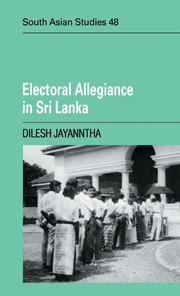Crossref Citations
This Book has been
cited by the following publications. This list is generated based on data provided by Crossref.
Stokke, Kristian
1994.
Dynamic Growth or Pauperization? Small-Scale Industries in Hambantota District, Sri Lanka.
Geografiska Annaler: Series B, Human Geography,
Vol. 76,
Issue. 3,
p.
187.
Hulme, David
and
Sanderatne, Nimal
1995.
Votes and Budgets.
p.
109.
Kristian Stokke
1995.
Poverty as politics: the Janasaviya Poverty Alleviation Programme in Sri Lanka.
Norsk Geografisk Tidsskrift - Norwegian Journal of Geography,
Vol. 49,
Issue. 3,
p.
123.
Field, Graham
1995.
Economic Growth and Political Change in Asia.
p.
183.
DUNHAM, David
and
KELEGAMA, Saman
1997.
STABILIZATION AND ADJUSTMENT: A SECOND LOOK AT THE SRI LANKAN EXPERIENCE, 1977?93.
The Developing Economies,
Vol. 35,
Issue. 2,
p.
166.
DUNHAM, David
and
KELEGAMA, Saman
1997.
STABILIZATION AND ADJUSTMENT: A SECOND LOOK AT THE SRI LANKAN EXPERIENCE, 1977–93.
The Developing Economies,
Vol. 35,
Issue. 2,
p.
166.
McCourt, Willy
2007.
Impartiality through bureaucracy? A Sri Lankan approach to managing values.
Journal of International Development,
Vol. 19,
Issue. 3,
p.
429.
Höglund, Kristine
and
Piyarathne, Anton
2009.
Paying the Price for Patronage: Electoral Violence in Sri Lanka.
Commonwealth & Comparative Politics,
Vol. 47,
Issue. 3,
p.
287.
Stokke, Kristian
and
Törnquist, Olle
2013.
Democratization in the Global South.
p.
100.
Siriwardane-de Zoysa, Rapti
2018.
Fishing, Mobility and Settlerhood.
Vol. 20,
Issue. ,
p.
129.
Siriwardane-de Zoysa, Rapti
2018.
Fishing, Mobility and Settlerhood.
Vol. 20,
Issue. ,
p.
167.
Peiris, Pradeep
2022.
Catch-All Parties and Party-Voter Nexus in Sri Lanka.
p.
1.
Peiris, Pradeep
2022.
Catch-All Parties and Party-Voter Nexus in Sri Lanka.
p.
125.
Peiris, Pradeep
2022.
Catch-All Parties and Party-Voter Nexus in Sri Lanka.
p.
81.
Peiris, Pradeep
2022.
Catch-All Parties and Party-Voter Nexus in Sri Lanka.
p.
31.
Peiris, Pradeep
2022.
Catch-All Parties and Party-Voter Nexus in Sri Lanka.
p.
177.
Jayawardena, Pavithra
2023.
Still in the ‘Waiting Room’.
Diaspora Studies,
Vol. 16,
Issue. 3,
p.
287.
Wickramasinghe, Sajini
2023.
Jobs for the Boys: Dynastic Politics and the Right to Equal Participation in Political Affairs in Sri Lanka.
SSRN Electronic Journal,





